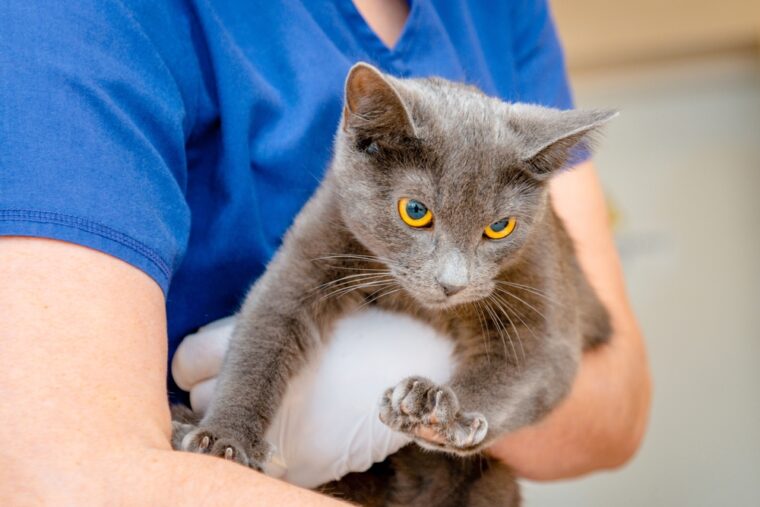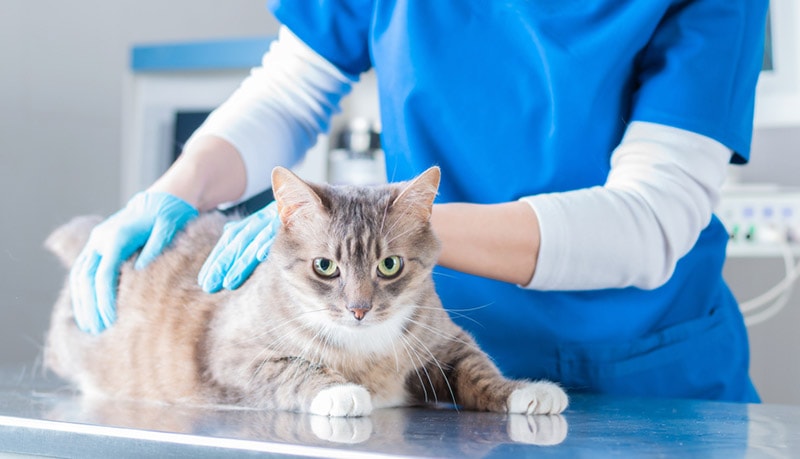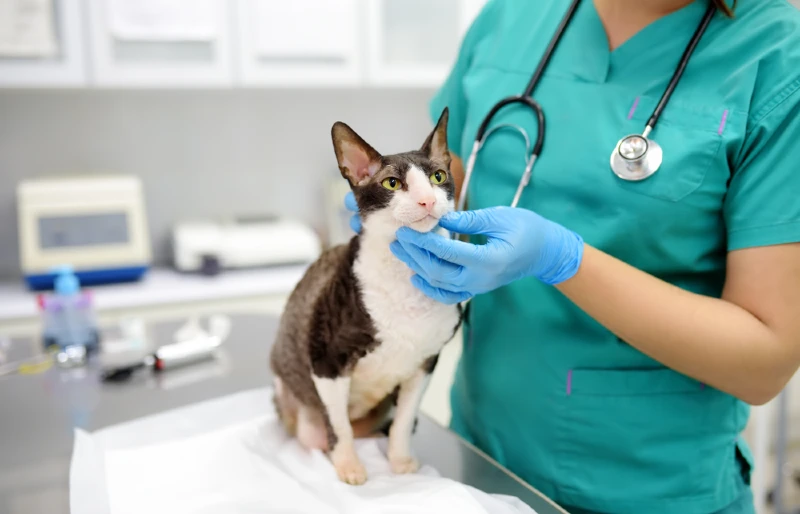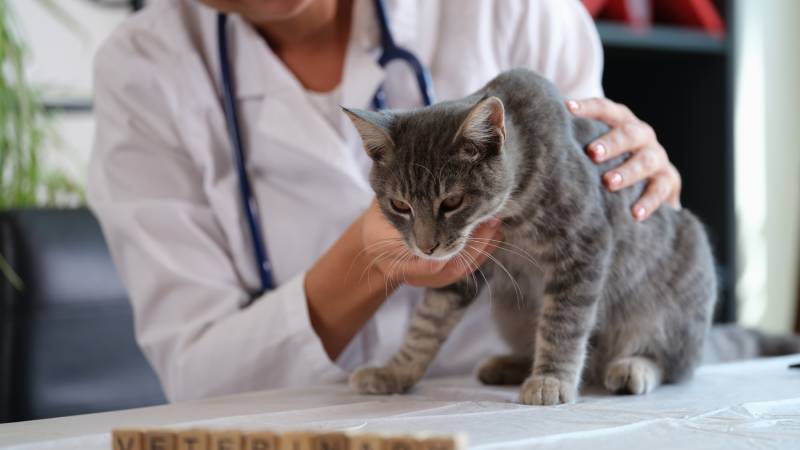
Lymphoma is a common cancer diagnosed in cats. Historically, it was associated with feline retroviruses, feline leukemia virus (FeLV), and feline immunodeficiency virus (FIV). Since vaccinations have controlled the prevalence of these diseases, we have seen an overall decline in the prevalence of lymphoma in cats. However, due to the increased lifespans of the feline population and improved diagnostics in veterinary medicine, lymphoma is still a significant disease that some cat owners become sadly acquainted with.
What Is Lymphoma?
Lymphoma is a cancer that involves the lymphatic system in the body, specifically targeting cells called lymphocytes in the bloodstream. The lymphatic system is responsible for transporting a substance called lymph around the body. It does this through a network of vessels that connect to the lymph nodes, which are little bean-shaped organs that can sometimes be felt externally on the clinical examination–under the chin, in front of the shoulders, in the groin, and behind the knees. The lymphatic system also comprises other structures in the body, such as the thymus, the spleen, the bone marrow, and the lymphoid tissue, which lines the surface of the intestines and prevents infectious agents from entering the cat’s bloodstream.
The lymphatic system plays an important role in the immune function of the body and in maintaining overall fluid balance. Overall, it’s a delicate and complex system constantly working in the background to keep the body at optimal function. It can often be likened to the “sewerage system” of the body. So, when it starts to malfunction, it can cause sequelae of systemic events in the body that are ultimately harmful to the cat.
The 4 Types of Lymphoma That Can Affect Cats
1. Gastrointestinal lymphoma
Since the advent of the FeLV and FIV vaccinations, intestinal lymphoma is the most common lymphoma seen in cats, accounting for 50–70% of all cases.1 Most cats are affected in their middle-aged to senior years, commonly being diagnosed between 9 and 13 years old.

2. Mediastinal lymphoma
Mediastinal lymphoma involves the lymphoid organs of the chest, including the thymus and lymph nodes. It is often seen in younger cats and has a high association with FeLV. In fact, 80% of cats that have mediastinal lymphoma also test positive for FeLV.2
3. Renal lymphoma
Lymphoma in the kidney has an association with FeLV and typically involves both kidneys. This tends to be diagnosed in more senior cats, and they will usually present to the veterinary clinic with signs of renal failure.

4. Nasal lymphoma
Nasal lymphoma involves the nasal cavity. However, there is the potential for spread from the nasal passages to the local submandibular lymph nodes and beyond.
What Are the Signs of Lymphoma in Cats?
The clinical signs of lymphoma can vary significantly, as it can affect various parts of the body. However, since gastrointestinal lymphoma is the most common form in cats, the following signs can be noticed:
Other clinical signs include:
What Are the Causes of Lymphoma in Cats?
Like with many cancers, the exact cause of lymphoma is unknown. While we know that there is an association between the infection of FeLV or FIV, we don’t know exactly how these diseases result in lymphoma. Lymphoma happens when lymphocytes, blood cells made in the bone marrow, begin to proliferate, but what causes this proliferation is unknown.
It is assumed that a combination of genetic and environmental factors disrupts the delicate dance of the cell cycle, resulting in mutations that cause lymphoma. For example, a 2002 study demonstrated a causal risk between cats exposed to tobacco smoke and the development of lymphoma. However, as with human medicine, more research needs to be done before we can have a better understanding of what exactly causes the uncontrolled proliferation of normal cells. Hopefully, this insight will come as science and medicine continue to advance.
The current thinking is that is multifactorial, meaning many factors contribute to the cancer, including lifestyle factors, genetics, exposure to viruses, and certain environmental agents.

How Do I Care for a Cat With Lymphoma?
It is understandably upsetting if your cat has received a diagnosis of lymphoma. However, treatment options can result in an extended and improved quality of life for your cat and in some cases, complete remission. Depending on the type of lymphoma that is diagnosed, this can involve a combination of chemotherapy, surgery, and radiation therapy through a veterinary oncologist.
Cats tend to respond to chemotherapy well and have few side effects compared to humans. Of course, whether you proceed with chemotherapy depends on the type of lymphoma that has been diagnosed, the stage at which the diagnosis is reached, your finances, and your cat’s temperament and their overall amenability to treatment. Certain lymphomas, such as small cell lymphoma of the intestinal tract, can be treated with tablets given at home (alongside regular monitoring), while other lymphomas require intravenous medication to be given weekly at an appropriate veterinary hospital.
If you elect not to proceed with chemotherapy, cats can be treated palliatively with a steroid, prednisolone. This helps provide a temporary improvement in quality of life, possibly putting them into temporary remission and making them generally feel better. This means fewer hospital visits for you and your cat, which might be preferable if your cat is the type to become extremely stressed in the veterinary clinic.
Frequently Asked Questions (FAQs)
How Is Lymphoma Diagnosed in Cats?
If your veterinarian suspects that your cat may have lymphoma, they will undertake several diagnostic tests. The first of these are usually blood tests and urinalysis, in which they will have a particular interest in the complete blood count, which shows how many white cells are in the blood. Bloodwork will also demonstrate your cat’s overall health, such as kidney, liver, and thyroid function, so the vet can rule out other potential diseases of concern.
Next is diagnostic imaging, which usually involves chest radiographs and abdominal ultrasound, so the vet can search for any abnormal growths or in the case of gastrointestinal lymphoma, thickened intestinal walls. If accessible, they may be able to do a “fine needle aspirate,” where they insert a needle into tissue to collect cells, which are then examined under the microscope to check for any abnormalities. If this procedure is inconclusive or impractical, the next step involves doing a “tissue biopsy,” where a small piece of tissue is removed and examined. This involves your cat having to undergo general anesthesia and being opened up surgically or the vet using endoscopy (a small camera being passed down into the gastrointestinal tract) to retrieve the tissue samples.

What Is the Prognosis for Cats With Lymphoma?
The prognosis of lymphoma in cats varies greatly. It entirely depends on the type of lymphoma diagnosed, the stage of diagnosis, and other comorbidities (or diseases) that your cat may be suffering from. Remission in lymphoma is an absence of clinical signs associated with the disease. Unfortunately, lymphoma is never completely cured.
A cat diagnosed with an aggressive form of gastrointestinal “large cell” or high-grade lymphoma on biopsy has a far more guarded prognosis of 6–9 months with an aggressive chemotherapy regime and potentially only weeks without treatment. Conversely, if they have been diagnosed with low-grade lymphoma of the intestinal tract, the prognosis with oral treatment at home is 2–3 years of remission or more.
Mediastinal lymphoma carries a poorer prognosis. With chemotherapy, cats have a survival time of 9–12 months. Unfortunately, renal lymphoma only has an average survival of 3–6 months, often resulting in spread to the central nervous system. Lastly, nasal lymphoma has an average survival time of 1 year with treatment, inclusive of radiation and sometimes, chemotherapy.
Conclusion
Now that you are hopefully armed with more information, you can make the right decision for your cat regarding what comes next with their treatment and care. While there’s no specific prevention for lymphoma, if your cat is completely vaccinated, that will decrease the risk associated with lymphoma from FeLV or FIV infection. Also, regular health checks are important, as early diagnosis can contribute to improved prognostic outcomes.
Featured Image Credit: ARVD72, Shutterstock







